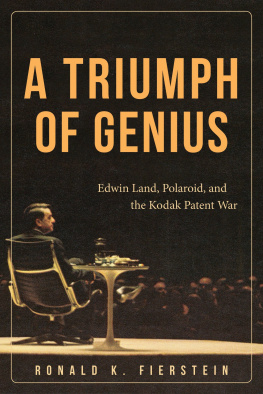
Cover design by Amanda Fry/Ankerwycke.
The materials contained herein represent the views of the author in his individual capacity and should not be construed as the views of the authors firms, employers, or clients, or of the editors, or of the American Bar Association or Ankerwycke, unless adopted pursuant to the bylaws of the Association.
Nothing contained in this book is to be considered as the rendering of legal advice for specific cases, and readers are responsible for obtaining such advice from their own legal counsel. This book is intended for educational and informational purposes only.
2015 Ronald K. Fierstein. All rights reserved.
No part of this publication may be reproduced, stored in a retrieval system, or transmitted in any form or by any means, electronic, mechanical, photocopying, recording, or otherwise, without the prior written permission of the publisher. For permission, contact the ABA Copyrights and Contracts Department by e-mail at .
Library of Congress Cataloging-in-Publication Data
Fierstein, Ronald K., 1950 author.
A triumph of genius / Ronald K. Fierstein. First edition.
pages cm
Includes bibliographical references and index.
ISBN 978-1-62722-770-4 (epub)
1. Land, Edwin Herbert, 19091991. 2. InventorsUnited StatesBiography. 3. Polaroid Land cameraHistory. 4. Instant photography. 5. Polaroid Corporation. I. Title.
TR140.L28F54 2014
771.3dc23
2014034317
Discounts are available for books ordered in bulk. Special consideration is given to state bars, CLE programs, and other bar-related organizations. Inquire at Book Publishing, Ankerwycke, American Bar Association, 321 North Clark Street, Chicago, Illinois 60654-7598.
www.ShopABA.org
TABLE OF CONTENTS
PROLOGUE
Its always about the light. Any photographer will tell you that. It was a beautiful December late afternoon in the desert town of Santa Fe, New Mexico, a place renowned for its unique light. The rocky landscape, faintly dusted with snow, would have been brightly lit in dramatic burnt orange and rose rays refracted from an afternoon sun sinking in the sky toward sunset. It is that magical light that illuminates the beauty in anything it reaches. It is the photographers best friend and secret weapon.
The little girl was excited as her father snapped away, taking image after image of her with his spiffy, high-tech camera. The father watched his daughter with delight and shared her joy. The wonders of light had enthralled him since his youth. They had already brought him great wealth and success. He was all of thirty-four.
But the year was 1943, and the high-tech camera was a Rolleiflex box model filled with Kodak roll film.
In those days, the film would have to be unloaded from the camera, taken to a pharmacy, and shipped off to a laboratory to be developed into negatives. That process would involve a series of baths in various chemicals, all done in the dark at controlled temperatures. Once dry, each negative would then have a precise amount of light projected through it, the image being focused onto photographic paper held at just the right distance so that the image was sharp. That paper, or positive, would next be developed to bring out the image, washed, and then processed further to stabilize the print. Finally, after drying, it could be shipped back for the little girl to see, long after the enchantment of the moment had faded away.
When confronted with an upset child asking silly questions seemingly impossible to answer, most fathers would respond with a comforting, if exasperated, Because, or Thats just the way it is, or even I dont know. But not this father. As a colleague acknowledged many years later, this man never had an ordinary reaction to anything. Instead of dismissively laughing off his daughters frustration, he shared it, he embraced it, and on the spot, at that moment, he committed himself intellectually to solving his daughters dilemma. He would figure out a way to create a photographic systema revolutionary camera and film combinationthat would allow images to be viewed immediately after being taken. He would invent one-step photography.
LANDISMS
If you are able to state a problem... then the problem can be solved.
Life, October 27, 1972
Every creative act is a sudden cessation of stupidity.
Forbes, June 1, 1975
Optimism is a moral duty.
Fortune, January 1974, p. 83
The only thing that keeps us alive is our brilliance. The only thing protecting our brilliance is our patents.
Newsweek, May 10, 1976, p. 86
Theres a rule they dont teach you at Harvard Business School: if anything is worth doing, its worth doing to excess.
The New York Times, April 27, 1977
Do not undertake a program unless the goal is manifestly important and its achievement is nearly impossible.
Lands Polaroid, Peter C. Wensberg, p. 170 (Houghton Mifflin 1987)
If you are right, the facts at the moment dont matter because in due course the facts will catch up with you.
Popular Photography, October 1977
A worthwhile invention must be startling, unexpected and must come into a world that is not prepared for it.
The New York Times, May 15, 1983
What the physical sciences teach the social sciences is how to fail without a sense of guilt.
Boston Globe, October 18, 1976
CHAPTER 1
A VERY SPECIAL YOUNG MAN
Life was getting progressively tougher for Avram Solomonovitch, his wife, Ella, and their three sons. They lived near Kiev, in what is today Ukraine. It was called the Jewish Colonization Association and had been organized by a wealthy European banker, Maurice Baron Hirsch. With its help, Avram and his young family sailed from Odessa to freedom. When they arrived in New York City, they were processed at the Castle Garden immigration facility, where Avrams name was anglicized to Abraham Land. The boys were renamed Samuel, Harry, and Louis.
After their arrival, the Lands were sent to an agricultural colony in Colchester, Connecticut. It was part of Baron Hirschs organization. Abraham worked on the farm as they all acclimated to their new country. By the end of the decade, they had moved to New Jersey, where they became naturalized citizens in 1888. Abraham got into the scrap metal business and eventually moved the family back to Connecticut, settling in New Haven. In the years after their arrival in America, Abraham and Ella had five more childrentwo sons and three daughters. It was a large family, but their fathers focus on education led all of the children into successful lives. Two of the younger boys attended Yale and went on to become lawyers. Two of the daughters became teachers. The others were successful in business.
Harry, Abrahams second oldest, had been born in Russia in 1880. He followed his father into the scrap metal business. Just after the turn of the century, Harry married Mattie Goldfaden, a fellow immigrant from Russia whose family had settled in Cleveland. They settled in Bridgeport, Connecticut, where, in 1904, their first child, a daughter they named Helen, was born. Five years later, on May 7, 1909, Mattie gave birth to their second child, a boy. He was named Edwin Herbert Land.
As a child, Helen apparently had a hard time pronouncing her younger brothers name and called him Din, a nickname that would be used by his closest friends and colleagues throughout his life.
In the early years of the twentieth century, most of the rest of the Land family moved to Brooklyn, New York, where they remained close and observant of their faith, gathering to celebrate Jewish holidays in groups as large as forty cousins and uncles and aunts. Conspicuously absent from these festivities were Harry and his family. A niece described them as being not unfriendly but cool and distant. Mattie was very, very aristocratic [and] very well educated. Whatever the reason, Harrys aloofness seemed eventually to infect Edwin, who by young adulthood had distanced himself from his larger family, as well as from his Jewish ancestry. He told relatives that he had given up the Jewish faith for business reasons. Im trying to live down even the honorable part of my past, he once told a journalist.
Next page









